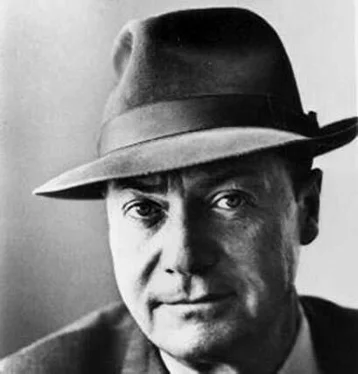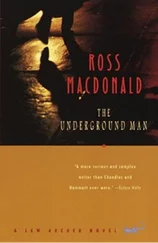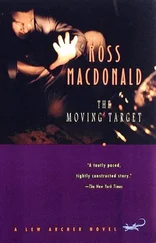“What about your father?”
He turned on me. “What about him?”
“You said that he was home from the war.”
“He didn’t stay,” the boy said. “He went away again around the same time Rose did. Maybe it was the same time. I don’t remember exactly.” He winced, as if the razor edge of memory was hurting him.
“He went back to the war?”
“The war was over, I know that much. It was over long before he ever came home in the first place.”
“Where did he go?”
“I don’t know.”
“Didn’t he tell you? Or didn’t your mother tell you?”
“I don’t know. I don’t remember.” His sneaker toe was digging a hole in the gravel. “I wish you wouldn’t ask questions about my father. It’s painful to me. I hardly remember him. Besides, his run-out has nothing to do with Rose Breen.”
I wondered. Maybe he was wondering too. He raised his eyes from his little excavation. They were bleak and blind in the sunlight. They winced away from mine like an animal’s.
The sound of a heavy car was approaching in the road.
“That’s Leverett now,” he said. “You’d better move your car. Leverett doesn’t like people to get in his way.”
I started to move the car to the side of the driveway. A mass of chrome and color hove up in my rearview mirror and honked at me. I got out, leaving the motor running. So did the other driver.
He was a middle-aged man in a dark gray suit that matched his dark gray hair. Either he had a good tailor, or he was very fit under his clothes. His face was brown with suntan that hadn’t come out of a bottle, and not bad-looking, except for a prissy little mouth under a prissy moustache. His eyes were keen and glacial.
“Don’t block the driveway, please,” he said precisely.
“I was just unblocking it. There’s room for you to get by.”
Published in The Archer Files (Crippen & Landru, 2007).
I went through my mail in search of hopeful omens. One interesting-looking envelope came from Spain and had pictures of General Franco and the Santa Maria on the stamps. It was addressed to Señor Lew Archer at my Sunset Boulevard address. Inside it said: “Cordiales Saludos: This comes to you from faroff Spain to call your attention to our new Fiesta line of custom furniture with its authentically Spanish motif…”
There was a bill from The Bottle Shelf.
Its size astonished me. Combined with the weekend I had just put in, at Palm Springs, it made me determined to quit drinking almost any day now. I was planning my anti-drinking campaign, with emphasis on how to spend all the money I would save on liquor, when the telephone on my desk rang.
It was Eric Griffin of the Beverly Hills law firm Griffin and Shelhovbian. I had done a little work for him in the past. He wanted to know if I was free to undertake a small job. I was.
“I have a young man with me in my office now. He’s the son of an old acquaintance of mine, and he seems to feel that he needs the services of a detective.” Griffin sounded as if he had his doubts about the need. “Apparently his girl has thrown him over in favor of some sort of foreigner. He seems to think that the man may be crooked or even dangerous.”
Behind Griffin’s voice I heard a younger man say: “He is dangerous.”
“I’ll let him talk to you himself,” Eric said.
“Not on the phone. Shall I come over there?”
“No, I’ll send him over to you. His name is Peter Jamieson Three,” he said with a faintly sardonic intonation. “Treat him gently.”
“Is he fragile?”
“Not exactly. I knew his father at Princeton.” His voice was full of unspoken information. “The family lives in Montevista. Peter will handle the financial arrangements himself, since he’s not really my client.”
The young man arrived in about twenty-five minutes. He was puffing from the climb to my second-floor office. He couldn’t have been out of his early twenties but his face was fattish and rather apologetic, the face of a middle-aging boy. His body was encased in a layer of fat like football padding which made his Ivy League suit too tight for him. He looked like money about three generations removed from its source.
“I’m Peter Jamieson.” He let me feel his large amorphous hand.
“Yes. Sit down. Mr. Griffin told me you were coming.”
“I heard him. Mr. Griffin thinks I’m making a fuss about nothing. I’m not, though.” He peered around at the mug shots on the walls. He had the kind of soft brown eyes which are very often shortsighted.
“I can’t make your girl come back to you if she doesn’t want to. Griffin will tell you the same thing.”
“He already has,” the young man said rather wistfully. “But even if she doesn’t come back, to me, we can save her from making a terrible mistake.”
Published in The Archer Files (Crippen & Landru, 2007).
It started out to be one of those germ-free cases, untouched by the human hand. The firm of lawyers who called me in, Trotter, Griffin and Wake, had the kind of reputation young men dream about aspiringly when they’re sitting up late studying for their bar exams. Their exquisitely hushed offices surrounded a garden court in Beverly Hills.
The lovely young thing in the front office looked at me with aesthetic distance. “Yes?”
“Mr. Archer to see Mr. Griffin.”
“Mr. Griffin is free now.”
He was a lean man in summer gray, with a white crewcut and a wintry smile. The tan against which his teeth flashed hadn’t come out of a bottle. He shook my hand vigorously but briefly, offered me a mottled greenish cigar which I refused, closed the box without taking one himself, waved me into a padded leather chair, leaned back in his own chair and clapped his hands, once.
Nothing happened, except that I jumped a little.
“We’ll get right down to business,” Griffin said. “That suits me and I’m sure it suits you. You’re a busy man, I’m given to understand.”
“By whom?”
“Mr. Colton of the D.A.’s office has recommended you highly, among others. He gave me to understand that you’re among the more intelligent and persistent members of your – ah – profession.”
“That was nice of him.”
“Yes. As you may know, we specialize in corporation law and don’t have much occasion to use detectives. I’m – ah – negotiating with you simply as a favor to a colleague.”
“That’s nice of you.”
He gave me a stainless-steel look. “Yes. Well. It appears that there is this certain person in La Mesa who needs looking into. You know La Mesa?”
“Not like the back of my hand, but I’ve been there. Who’s the certain person?”
“He calls himself Smith. Presumably Smith is not his real name. He’s a man who came to town – to La Mesa, that is – several days ago. Apparently he’s been stirring up a certain amount of trouble, of a rather indeterminate nature.”
“And I’m supposed to run him out of town?”
“Nothing like that,” he said sharply. “Your assignment is to find out who he actually is, where he came from, what he’s doing in La Mesa. Get to know him, if you can. Get him talking. We want a full report on his background, his identity, his intentions.”
“Where can I find him?”
“He’s probably staying at some waterfront motel. It shouldn’t be too hard to pick him up – I can give you a fairly good description of the man.”
“You’ve seen him?”
“No. This is at second hand, but I can assure you of its accuracy.” He shuffled the papers on his desk and picked out a sheet of typewriter paper scribbled over in pencil. “Smith is a man who appears to be in his middle fifties. His hair has streaks of gray in it. It was originally black. His skin is quite dark – whether for – ah – racial reasons or simply because he’s been out in the sun a lot, I can’t say. Brown eyes, almost black – his eyes are said to be his most notable feature. Also, he has a rather large nose with a hump in it – evidently broken at some time. This and his general manner give him the appearance of a rather rough-looking customer, and a fairly exotic specimen, you might say.”
Читать дальше












